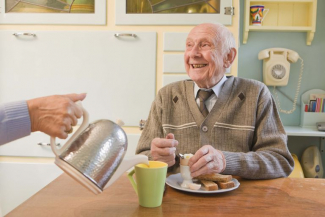
Caregivers play many vital roles in their care of people with Alzheimer’s Disease and Related Dementias (ADRD), including preparing meals and assisting during mealtimes. They know which foods and beverages an individual enjoys, as well as those that are not tolerated — either because of dislike, or because the person with dementia may have difficulty chewing or swallowing particular items. This puts the caregiver in the unique position of being the first person to identify signs and symptoms of dysphagia, a swallowing disorder that can lead to pneumonia and malnutrition — potentially life-threatening conditions.
By recognizing a potential swallowing impairment, a caregiver can help a person with dementia have improved swallowing safety, minimize the risk of food or liquid entering the airway (aspiration) and its negative health consequences, and experience more enjoyable mealtimes. Below are ways a caregiver can be an active partner in helping a person with a swallowing disorder.
Look for signs of a swallowing problem. A sign that someone has difficulty swallowing may be obvious, such as choking during meals; however, many times the signs are subtle, like throat clearing after drinking. Other signs and symptoms of dysphagia include a wet-sounding voice during or after eating or drinking, complaints of food sticking in the throat or chest, unexplained weight loss, dehydration, or repeated chest infections. Additionally, simply holding food in the mouth for a prolonged period of time or avoiding specific foods may be an indication that a person is experiencing a swallowing problem.
Seek out a swallowing evaluation. Although some signs may be understated, they still warrant follow up with a physician or advanced practice provider. A medical provider will determine if the patient needs a swallow study, which involves using a video x-ray to identify if food and/or liquid are entering the airway or are remaining in the throat after swallowing. The medical provider may also place a referral to a speech-language pathologist (SLP) who specializes in swallowing.
Work with a swallowing expert. If dysphagia is identified during a swallowing examination, an SLP can advise the individual and their caregiver on which foods and liquids are safest to eat and drink, identify the least restrictive diet, recommend specific strategies that may be helpful during mealtimes, and determine if the individual would benefit from swallowing therapy. SLPs recognize how critical a caregiver is in therapy and will work with the caregiver on how to best assist a person with dementia when eating and drinking.
Understand the importance of the caregiver. Swallowing disorders can be distressing and emotional for both the person with dysphagia and their caregiver. When a physician and SLP are involved in the care of someone with dysphagia, their support extends to the caregiver as well. The critical role of the caregiver is valued: When a caregiver reports possible signs of dysphagia, severe health consequences may be prevented. Furthermore, early identification of a swallowing impairment may lead to better outcomes for those with dysphagia, such as increased swallowing safety and nutrition, and an improved quality of life for the individual and their caregiver.
Research opportunity
Dr. Nicole Rogus-Pulia is currently conducting a research study on treatments for people with dementia and dysphagia, which also involves examining caregivers’ experiences. To learn more, visit Lingual Strengthening in Patients with Memory Loss on our Open Studies page.
Story by Sara Gustafson, Research Specialist
- Log in to post comments



